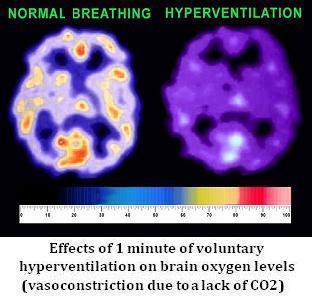- Updated on October 14, 2020
![]() By Dr. Artour Rakhimov, Alternative Health Educator and Author
By Dr. Artour Rakhimov, Alternative Health Educator and Author
- Medically Reviewed by Naziliya Rakhimova, MD
Stop Epilepsy Seizures During Sleep: Breathing Remedy
 The more you breathe (deeper and/or faster), the less oxygen and blood are delivered to your brain. (This fact has been confirmed by dozens of medical studies – see the links below.)
The more you breathe (deeper and/or faster), the less oxygen and blood are delivered to your brain. (This fact has been confirmed by dozens of medical studies – see the links below.)
Clinical experience of nearly 200 Russian medical doctors with hundreds of epileptics (including children)
suggests that one can have seizures during sleep, if and only if he or she has an irregular, ineffective, or/and heavy automatic respiratory pattern (i.e., if one has hyperventilation), mouth breathing, and/or chest breathing.
Furthermore, numerous medical studies have confirmed the link between low CO2 levels in the arterial blood (due to hyperventilation) and the chances of seizures while sleeping (see the links on dozens of studies below). Hence, when you overbreathe, you have less oxygen and CO2 in the brain.

 Breathing in most people becomes more irregular and abnormal during night sleep and especially early morning hours.
Breathing in most people becomes more irregular and abnormal during night sleep and especially early morning hours.
Hence, it is a known medical fact that early morning hours have the highest rates of seizures during sleep.
Russian MDs also found that people with normal breathing never develop any sleep seizures.
Hence, the goal is to normalize one’s automatic or unconscious breathing or to breathe normally 24/7.
An additional recently discovered factor for sleep seizures and low body oxygenation is the electrical charge of the human body.
When the body is connected with Earth (due to barefoot walking, sleeping on the ground or skins of animals, and so on), the body has a slight negative charge (an excess of electrons).
Modern people have a very high positive charge (due to static electricity) that often achieves hundreds or many thousands of Volts (as during electrical discharge from the body to surrounding metal objects). Therefore, grounding alone often stops all sleep seizures in children and adults.
Here is a program developed by Russian physicians (slightly modified with the addition of electrical grounding) and tested on hundreds of people with epilepsy and seizures while sleeping.
It involves the correction of lifestyle risk factors in order to increase body oxygenation by making our breathing lighter (slower) and more regular during sleep.
In this video, Dr. Artour Rakhimov explains how to sleep sitting – this is a great lifestyle change to prevent nocturnal seizures and achieve great sleep without signs of epilepsy.
Lifestyle changes to prevent epilepsy seizures during sleep
 1. You need to ground yourself for sleep so as to be electrically connected with the negative charge of Earth (see Earthing for more detail)
1. You need to ground yourself for sleep so as to be electrically connected with the negative charge of Earth (see Earthing for more detail)
2. If you find that your mouth is often dry in the morning, use this Manual “How to maintain nasal breathing 24/7”
3. If you sleep on your back at least 2-3 nights per week, use How to Prevent Sleeping on Back. (If you are uncertain about the effects of sleeping positions, study tens of medical studies from Best Sleep Positions Medical Research Summary.)
Ideally, try to alternate between sleeping on your chest (the prone sleeping position) and the left side. (Sleeping sitting is an even better option to avoid sleep seizures.)
4. Make sure that you have good air quality (positive and negative ions or windows open, no carpets on the floor, etc.).
5. Do not overheat yourself by using too warm blankets.
6. Have your supper earlier (4-5 pm) and eat only a small snack later, if you get hungry at 8-10 pm.
7. Do more physical exercise during the day with strictly nose breathing.
8. Increase your evening body oxygen level or CP (when you go to sleep) as much as possible.
9. Use the belt technique for diaphragmatic breathing during your night sleep to prevent chest breathing and hyperventilation causing seizures during sleep
10. Most importantly, you need to increase body oxygenation (the morning result for the DIY body oxygen test) in the morning up to X+ seconds. The number X is provided in the next paragraph as your bonus content.
Usually 30+ seconds for the morning CP is enough to be free from sleep epilepsy seizures. A little better result of 35+ s is a certain guarantee. Success!
[/sociallocker]
For more details and other lifestyle factors and parameters, consult Good Sleep Hygiene and Learn Buteyko Breathing Exercises Section. If you retrain your breathing and have more than 35 s for the body-oxygen test, you will be free from all types of sleep seizures.
Related web pages:
– Treatment of seizures program (90% success rate)
– How to stop seizures naturally Hence, in order to prevent sleep seizures, one should understand the mechanism of daytime seizures.
– Seizure threshold is controlled by breathing pattern and blood gases
– Cause of seizures
– Western studies treated seizures with CO2 naturally and with great results.
Or go back to Epilepsy seizures
Below are authentic comments, questions, and testimonials from the same page on the old PHP site before we converted it to WordPress.
On 2018-06-21T08:03:35, Dr. Artour (mod) wrote:
That is how most people die due to seizures. This page explains the effect and quotes studies that confirmed the effect for epilepsy too): https://www.normalbreathing.com/index-MorningHV.php
On 2018-06-20T19:57:32, Dianne Garcia wrote:
Can you die due to sleep seizure?
On 2017-02-19T15:54:29, A wrote:
I developed nocturnal seizures 10 years ago when I was 35. Had been on every seizure medicine possible with terrible side effects and no relief… my memory seemed to be erased and it was pretty terrible. 2 years ago I tried Tegretol which was the first medicine that worked and that I feel normal on. However, in the least few months, the frequency of the seizures is creeping up. They happen right before I wake up and ruin 2-3 days following because I’m just out of it and back to square 1 :
I am very thankful to have found this site and will try anything at this point it’s why I’m searching) better late than never— thank you so much for publishing and sharing this! Please keep the information coming.
On 2015-08-04T08:02:26, Anonymous wrote:
had 1st seizure at 51 after I was put on CPAP. I used to practice deep breathing and feel that CPAP caused me to sleepwalk as well as have the seizures. Lost CDL and unemployed after CPAP. I think CPAP caused me to have shallow breathing.
On 2015-04-05T07:40:06, Melanie wrote:
This is the first time I heard of this. My 6-year-old son has had seizures for almost 3 years now. We’ve recently increased the dosage of his medication recently only because his seizures are lasting longer than before. Sometimes he gets seizures 1x a month and sometimes 7x a month. He also sleeps with us in case he has a seizure. His neurologist keeps saying he’ll grow out of it but we don’t know the cause. Lately, his allergies have been very bad and I’m wondering if his stuffy nose at night may contribute to his seizures.
On 2014-11-09T09:50:29, Tim wrote:
Next Morning – I have now have had a nocturnal seizure for four days in a row. This is very unusual for me. Usually, I have one approximately once per month. Has anyone experienced seizures with low humidity? It is very dry in the house. I have seen sites that mention seizures with high humidity but not low. I feel if the humidity is low, the mucous membranes will become a bit boggy and inflamed much like when one is sick). This will affect air passage through the nose and possibly lead to a seizure.
On 2014-11-08T13:35:00, Tim wrote:
I have had nocturnal seizures for 20 years since I was 13 years old. I have been trying to figure out the cause for a long time. My seizures are always at night and approximately 85% of them are shortly before waking in the AM. I don’t know why this has never been suggested by the many Neurologists I have seen. I know this is how the majority of them are trained. I am a P.A. myself and treatment is mainly following a protocol. Try this medicine, try another, add this one, etc. I was the one who really tried to determine the root cause rather than just treating and trying to prevent the results with medication. I have gone back and forth between msg, aspartame, apnea, etc. trying to figure this out. I now really do think this is due to my breathing pattern increased CO2).

